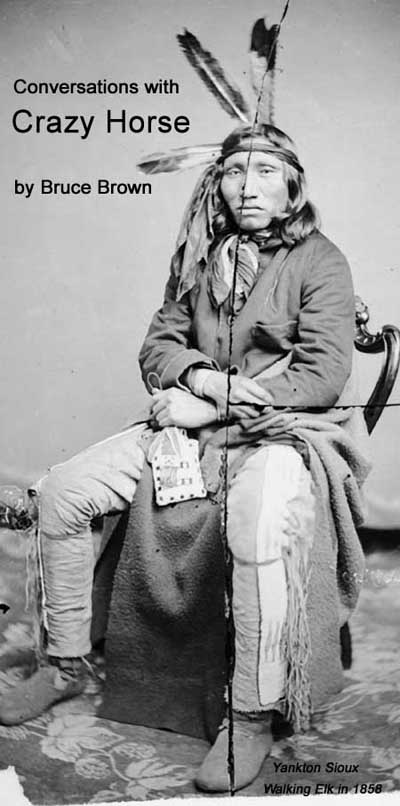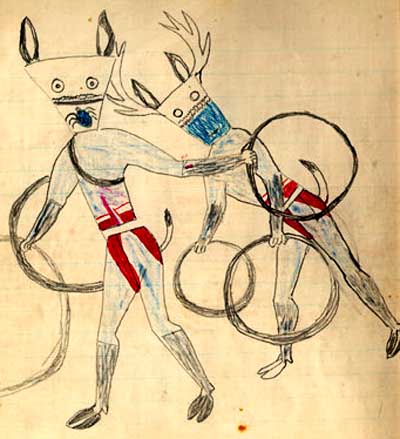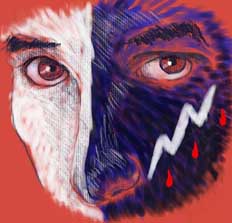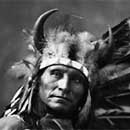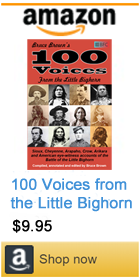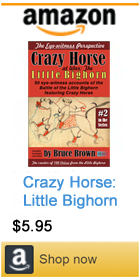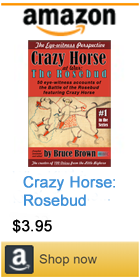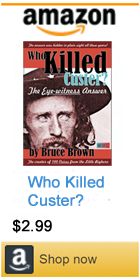"Don't you agree?" she asked. I sat in stupefied silence while she got into her car and drove away without looking back at me once, not even in the rear view mirror. I couldn't believe it. I mean, I kept replaying the tape and I couldn't believe it.
Then Crazy Horse said...
The dreamed is real. The real is dreamed.
Oh Jesus I thought, still watching the empty place in the street where Susan's car used to be. I am not in the mood for this right now. I replied...
What the hell is that supposed to mean? 'The dream is real?' 'The dream', or at least the closest thing I've got to it in my own personal little life here, 'is GONE.' Weren't you paying attention? She just told me to get lost, preferably somewhere I can get treatment.
At that moment I felt a deep human need to hit something smaller than me. Not having a dog, an illegal detainee, or a third world nation immediately available, I hit what Americans like to hit the best. Bam! I gave the steering wheel a good shot with the flat of my hand.
Instantly I heard a "tink," and the honestly not-too-bad-looking pseudo-enamel Buick medallion in the middle of my steering wheel fell out. I almost caught it with my finger, but it rolled away inside the steering wheel where I couldn't quite reach it.
Things were really lining up for me now. I could feel it. My girl friend just left me because I hear voices, and my voices confidently assure me that I really AM going nuts, which is good news in their estimation. Be pacific, they say. Everything's just a dream that keeps getting turned inside out over and over and over again.
The raw truth -- I am a 31 year old bike mechanic pretending to be a 27 year old digital auteur hanging out with 23 year old hotshot mountain bikers who frequently act like 12 year olds. There's some down shifting for you. People like me are called "bike bums" in an obvious comparison to ski bums. Actually, though, bike bums are a couple steps below a ski bums in the natural hierarchy of trips, as set forth in what my dad calls the Book of the Grateful Dead.
If your daughter gets involved with a ski bum or a board bum, at least you have a chance of getting good hair and an attractive settlement. If your daughter gets involved with a bike bum, the package deal is more likely to include bad teeth and odd personal habits.
Who'd want to be a bike bum? Not too many, and in their own minds, few really are, no matter how much they enjoy bike riding. I knew one wrench who was really a white Rasta shaman in his mind. Another guy got picked up every day after work by an elegant woman in a sable-colored BMW 740IL. And in my mind, I was an artist, pushing the envelope of digital creation with the occasional painting I got the time to make, usually for a festival or some other gone and forgotten endeavor.
Where do the years go, man? Before my first concussion, I thought I could fly to the moon on a bike. And I didn't even care about it, 'cause I was positive that the international art world was gonna eat my stuff up. Repairing bikes was just something I did on the side on a conveniently never quite full time basis. Eventually I worked my way up to the Service Department at the Sisoula Cyclery, a veritable license to lean on the counter and BS about bike parts for hours while de coolest reggae in town pulses on de store's big sound system.
And I was bad with it! I had glimpsed the dark Zen mystery at the heart of the bicycle repair business -- bikes always need repair -- and its dark corollary -- therefore someone always needs bike mechanics. Plus, I had a totally killer apartment above a copy mart with a view of the Bitterroot River from my computer, and I sometimes did digital water colors in the evenings when the ducks were coming down. That was in those rare moments when I wasn't flagrantly wasting time or making the wrong person laugh.
Very occasionally, one of those wrong people would have a little real money to spend on graphics for something and I'd actually get a paying art job. I did a great cover for a Bagged Chickens CD that was never released. I also did the cover for the program for the first Empty Space Theater production, not the Empty Space that later became famous but the one that folded just 18 months before. The thing people remember me for, though, is the hallway to the restrooms at the Circle Q Tavern.
In my mind, it was about a progression towards peace and enlightenment, the journey of mankind, I guess you could say. I did it as the prairie at dawn, with the late night sky still showing a few stars on the right where you entered the hall, and the brightest part of the sky, the moment just before sunrise, on the left just as you got to the lavatory doors, one on each side. Then running across the top I did a frieze of stenciled faux tiles showing beer bottles running and jumping like desperate salmon toward the lavatory doors. People actually stopped me on the street a couple times and asked, "d'ju do that hall at the Circle Q? Great hallway, man!"
The women were good too, surprisingly good for a greasy geek like me. There was Jill and Dor, and then Susan, who was an entirely different order of being. Susan was vivid and quick and very present. Things just seemed more intelligent and interesting when she was around. When I was with Susan and we'd hit some writers' party on a Friday night in Sisoula, I felt like I really was an artist and that everything really was wired to work out.
Then Susan dumped me, and to complete my power dive plunge to personal and professional zerodom, I quit my job at Sisoula Cyclery. Didn't see what else I could do. Then I was just a 31 year old guy who wasn't pretending to be anything at all, except a maybe 31 year old guy sitting in the front seat of his car with a half warm six pack of beer. Can you imagine that?
"HEY! LOOKS LIKE SHIT!" I smiled and shouted out the car window to my neighbor, confident he couldn't hear me over the lawn mower. He had everything neat and tidy, completely under control and utterly artificial. On his car there was a bumper sticker that said, "God bless the President. God bless our Troops."
Aside from supporting torture, terrorism and mass murder in my name -- as well as sullying America's flag with innocent blood -- I had no major complaints with him as a neighbor. He didn't play loud music and he was hell on crab grass. At the same time, I thought, "too bad this guy's such a narrow slice of pie as a human being. I mean, this guy is REALLY living in a dream."
Crazy Horse came then. I could feel him, but he didn't say anything for a while. Finally, he began to speak, and immediately I wondered, "why am I hating this? There's something, something in the tone that's almost -- that's it! -- parental." Crazy Horse was speaking like a parent who has picked up a child's heedlessly dropped garment, and then offered it back when the wind turned chill. He said...
The dreamed is real. The real is dreamed.
At the great Sun Dance before the Battle of the Greasy Grass, Sitting Bull had a vision that Blue Coat soldiers fell up-side-down out of the sky into the village, and they all perished.
Sitting Bull's dream was real. The Battle of the Greasy Grass was dreamed.
Look around you! The bald one riding the snarling lawn creature with the American flags -- do you think his world is "real"?
He worships soulless shadows and imaginary beings, "corporations" as you call them, and he thinks they are real! True human freedom and the Earth itself are worthless to him, except as sacrificial offerings to these soulless, imaginary creatures.
And he believes it not just his right -- but his DUTY -- to impose his evil dream on the rest of the world.
He is like a man who forces everyone in camp to drink bad water.
I laughed and replied
Remind me to introduce you to him.
I watched the back of the Bald One as he mowed around the patio under the laundry line. His little blond-haloed bald spot had a tinge of crimson, but his soft legs, visible below his expansive Bermuda shorts, were doughy and white.
Crazy Horse seemed to have been looking at the same thing, for he said...
American men today are like caponized fowl -- big bodies and tiny heads. If I was alive today I would crack open this bald one riding the lawn creature as easily as you crack open grouse eggs for breakfast.
I wondered...
What about the Americans you fought against?
Could you "crack them like eggs for breakfast"?
Crazy Horse deadpanned...
Lazy White Bull could.
I persisted...
Seriously, how would you rate the American soldiers you faced?
Crazy Horse replied...
Few American soldiers had the fighting heart of Lakota and Shahiyela warriors.
I asked with a little emotion, I'm afraid...
There were no brave Americans? Come on! American literature is full of stories of brave Americans, many told by Indians. Even Sitting Bull said Custer and his men were "as good men as ever fought," or words to that effect.
Now there was some sort of disturbance in my connection with the Land of the Dead. It seemed mirthful. Apparently I had said something funny.
Crazy Horse replied, however, without any apparent humor...
Don't thrill yourself too much with the praise of the defeated. Old men lying on their backs with the hot, foul breath of the beast in their face will say anything the beast wants.
I will tell you how it was. There were some brave Americans. I remember the one you called Private Adolf Metzger. He died bravely at the Battle of the Hundred in the Hand. When your people found his body, he was fully dressed, unscalped, and covered with a buffalo robe. He cost us greatly, yet we respected and honored him as a valiant foe.
I also remember the one you called Captain Myles Keogh. He fell early at the Battle of the Greasy Grass with with a shattered knee and unable to retreat further. He fought there to the death. His non-commissioned staff, a trumpeter and three sergeants, stayed with him, and all finally fell together in a heap. He was a brave soldier, and we did not mutilate his body in any way.
We always respected brave men -- even Long Hair. Apart from missing a finger and having a stick jammed up his diseased little white penis, the one you call Custer was pretty much untouched after he fell.
Same with Long Hair's brother, Little Hair. Except for where Rain In The Face hacked his still-beating heart out of his chest, took a bite out of it and spit it in his face, and the squaws' later mauling of that same face, frozen in awful amazement, the one you called Captain Thomas Custer lay as he fell.
Again I heard the faint laughter of wind in the cottonwood leaves at dusk, somewhere in the distance -- not of space, but time.
Monah Setah, or Young Grass That Shoots in Spring, found the Custer brothers' bodies near the top of the hill after the battle. She was carrying Long Hair’s gonorrhea and Little Hair's son, called Yellowbird or Yellowtail, but she protected what was left of their bodies through the night.
The Americans said Rain In The Face hated Little Hair for arresting him at Standing Rock, but that was just part of it. Rain In The Face hated both of your Custer brothers for what they did to Young Grass -- killed her father, gave her gonorrhea and left her with child.
One thing we never lacked was reasons to hate the Americans.
Now something amazing happened. I suddenly felt the angry presence of another from the Land of the Dead. It was Little Big Man, Crazy Horse's explosive long-time lieutenant, who also ultimately played a Judas role in the Crazy Horse saga.
Here's the quintessential Little Big Man scene. Sent by Crazy Horse as his emissary to the Treaty Council of 1875, Little Big Man made his entry by firing off a bunch of shots as he charged his grey pony up to the parley table, leveled his still-smoking rifle at the stunned treaty negotiators, and threatened to kill anyone who signed away the Lakota's right to the Black Hills or Paha Sapa.
Now Little Big Man barked at me...
You Americans think you get to kill our buffalo, steal our land, kill our men, fuck our women and leave them with your cunt rot? Is that the act you're putting down here, ass lick?
Mercifully, a woman's voice spoke next. Somehow I knew it was Black Shawl Woman, Crazy Horse's wife...
Then Young Grass protected their bodies! Young Grass protected the bodies of Long Hair and Little Hair through the night. You talk about a warrior's heart. Young Grass has the biggest heart of all.
In my head I heard what sounded like many staffs pounding soft earth.
I was stunned by the exchange about Young Grass or Monah Setah, sometimes spelled Monahseetah. She was the beautiful daughter of Cheyenne Chief Little Rock, a friend of the Americans who was murdered by Custer's men at the Washita Massacre. During her imprisonment at Fort Laramie (that's right, Custer murdered friendly Indians and his surviving Indian victims were imprisoned, and in the case of Monasetah, turned into a concubine), Young Grass served as interpreter for the Custers, and rode with them in the field in the spring of 1868.
I also couldn't believe the matter-of-fact way Crazy Horse was talking about George Armstrong Custer -- called Long Hair by the Sioux and Son of the Morning Star by the Crow Indians -- the man who is forever linked to Crazy Horse because of the events Crazy Horse was describing.
My mind swam with questions, and somehow I managed to ask an incredibly stupid-sounding one...
Custer was brave?
Crazy Horse turned my question back at me...
Was Custer brave? He welcomed death, and it found him.
I knew it was probably pointless, but I couldn't resist asking the eternal question...
Who killed Custer? Some people say Gall and some Rain In The Face. Others say it was Brave Bear, Walks Under The Ground, Brown Back, Flat Hip, Red Horse, Charging Hawk, or Spotted Antelope.
Fast Eagle said he held Custer's arms while Moving Robe Woman, the Hunkpapa woman warrior, killed Custer.
Amos Bad Heart Bull said you killed Custer, and of course Lazy White Bull claimed he killed Custer. Who really killed Custer?
Crazy Horse paried...
You know why there are many stories about who killed Custer, don't you?
I hazarded...
Because nobody really knows?
Crazy Horse said...
It is so.
I said...
But you know. Tell me -- who really killed George Armstrong Custer?
There was a pause. Then Crazy Horse said...
White Cow Bull shot Custer. It happened near the beginning of what you call the Custer Fight, when Custer and the Grey Horse Company tried to cross the river at Medicine Tail Coulee and attack the Cheyenne camp.
When the Bluecoats came charging across the Greasy Grass, there were a lot of women and children hiding there, but a few warriors too. The Cheyennes White Shield and Bobtail Horse were there. So was White Cow Bull, an Oglala. His first shot knocked Custer off his horse into the water. That was the bullet hole your people found below Custer's heart.
I was incredulous...
White Cow Bull killed Custer?!
Crazy Horse said...
White Cow Bull shot Custer.
I replied...
Cute. OK, who killed Custer?
Crazy Horse said...
When Custer hit the water, all the other Bluecoats stopped. They went to him and pulled him out of the water. One of his brothers them threw him over his saddle, and they retreated back to the far side of the river, where they fired two signal volleys and waited for reinforcements that never came.
The pieces were suddenly starting to fall together now. I said...
So Custer wasn't in command during the crucial, unexplained 20 minutes pause! He was totally out of it while the ship drifted towards the reef. That makes perfect sense -- I mean it makes perfect sense in terms of the historic record -- but he wasn't dead?
Crazy Horse corrected...
He wasn't dead yet. Your medicine men were afraid to move him -- afraid it would kill him -- and your sub-chiefs were distracted by his grave condition. He was only barely conscious and he hadn't shared his battle plan with any of them. So they had no plan, except to wait for the war chief you call Benteen, and hope. They were like buffalo that didn't run.
I said...
OK, but I still want to know. Who killed Custer?
Crazy Horse said...
Has Whiskers. Near the end. That was the bullet hole you found in the left temple.
That would be Custer's adjutant, Lt. W.W. Cooke, who wore long, luxuriant black muttonchop whiskers. I said, half to myself...
Wow. So that's how it ended?
Crazy Horse interrupted...
Yes and no, because that wasn't the end. Just before Has Whiskers shot Long Hair, the last of the grey horse company made a dash for the Little Bighorn River. There were about three dozen of them, all on foot. They jumped into Deep Coulee and tried to hide in the long grass. They were the last soldiers to die. We hunted them like rabbits.
Another voice reminisced fondly...
When I rushed a tall, well-built soldier, he threw his rifle at me without shooting. We grabbed each other and wrestled there in the dust and smoke. He hit me with his fists on the jaw and shoulders, then grabbed my long braids with both hands, pulled my face close and tried to bite my nose off. I yelled as loud as I could to scare him. He drew his pistol but I wrenched it out of his hand and struck him with it three or four times on the head, knocked him over, shot him in the head and fired at his heart. Ho hechetu! That was a good fight, a hard fight. I enjoyed it.
From the story, I knew this must be Lazy White Bull. Later in life, Lazy White Bull publically took credit for some of the heroic deeds of Crazy Horse and other Lakota warriors, but that didn't seem to have affected their relationship in the Land of the Dead, which was clearly affectionate.
Crazy Horse continued...
Mostly the Americans were like their horses, large and ill-suited to the terrain. They could kill women and children and old men in surprise attacks at dawn, but they often panicked when they found themselves in a real fight.
Man-for-man, the Americans weren't even a match for the Crows or Shoshonis.
There was a pause. Evidently there was another commotion in the Land of the Dead. During the lull, I thought to myself, "well, who was?"
General Anson Mills, who faced Crazy Horse at the Battle of the Rosebud, called the Sioux and their Cheyenne allies "the best cavalry in the world." Major Marcus Reno, who faced Crazy Horse at the Battle of the Little Big Horn -- and had his defensive line in the timber smashed by Crazy Horse's initial flanking charge -- said, "The [Sioux and Cheyenne] Indians are the best light cavalry in the world, and I do not except even the Cossacks."
And it makes sense, when you think about it. What most of these guys did for their days jobs was hunt buffalo at full gallop, point-blank, with a short bow. Talk about nerve and strength and pure horsemanship married to the high speed kill! These guys had it. They'd done it all their lives, and their culture gloried in the kill, killing food for personal sustenance, and killing enemies for personal glory, as well as the larger glory of what Sitting Bull called the "Great Sioux Nation."
The Americans called them the Teton Sioux -- Teton, a corruption of Titunwan, meaning prairie people ("they live where they can see") and Sioux, an abbreviation of Nadouéssioux, meaning snake or serpent, their traditional eastern enemy the Ojibwas' insulting term for them. They called themselves Lakota or Dakota or Nakota -- depending on the dialect -- and historically they and their Cheyenne allies ruled a wide swath of the Great Plains of North America, land now claimed by the United States and Canada.
The ghostly specter of their nation remains in the place names of the Great Plains. In a rough sense, you could say their realm stretched from Dakota City, Nebraska, to Sioux City, Iowa, to Sioux Falls, South Dakota, to Cheyenne, Wyoming, to Bighorn, Montana, to Buffalo, North Dakota. They even laid claim -- a claim that Sitting Bull exercised -- to the buffalo prairies in what is now Saskatchewan, Canada. At the heart of the Great Sioux Nation lay the Black Hills, Paha Sapa, the ancient, gold-rich land they held most sacred.
All Seven Council Fires or bands of the Teton Sioux -- Hunkpapa, Oglala, Brule, Miniconjou, Two Kettles, Black Feet, and Sans Arc -- and the Cheyenne were warrior people, fierce and free and forever foraying on the fringe of their vast western territory, fighting for buffalo, for ponies, and for the love of a good showy fight.
By the end of the American Civil War, Crazy Horse already fought 100 more battles than any American Army general he ever faced. Still, the Americans were usually better with firearms than their Indian adversaries, so when Crazy Horse came back on the line, I asked...
What about marksmanship? The Americans were better shots. That shot by the American sniper that killed Big Crow at Wolf Mt. was a hell of a shot -- 200 yards uphill with the blizzard just starting to whip in!
Crazy Horse replied coldly...
The Americans always had more bullets for target practice. The Americans' ammunition was better too, with a good hot 70 grain load of powder.
And now with more intensity...
We would have killed ALL the Americans at Wolf Mt. if we'd had even HALF the ammunition the Americans had! We would have killed every Bluecoat. It would have been like Long Hair at the Greasy Grass. We beat Bear Coat twice that day on the ground he chose! But we didn't have the bullets to finish the kill, and Bear Coat had the howitzers.
Now I heard yet another voice from the Land of the Dead. It was Hump, Crazy Horse's mentor or kola, who lightly quipped...
Even Lean Elk was a better shot than Little Big Man.
Lean Elk was the half-breed son of a trader at Fort Laramie who had to hide out with his Sioux relatives after he killed a soldier in an argument over a prostitute; Little Big Man was Crazy Horse's friend and lieutenant, and one of the most powerful warriors in the free Sioux force.
Evidently Hump's quip was considered very funny by every one in the Land of the Dead except one, Little Big Man, who snarled coldly ...
I only need one bullet for you, Hump.
Seeing trouble on the right, I steered for trouble on the left, asking...
But don't you think the American's had stronger medicine than the Lakota?
Crazy Horse snorted ....
Stronger medicine? The opposite! The Americans and their medicine are diseased. Their star bowl is meager -- when they look up at night, they see only a few stars instead of great herds beyond count.
I realized what Crazy Horse said was literally true -- most modern Americans rarely see the natural splendor of the night sky, whether or not they are moved to look up. I was still caught up in the game of verbal ping-pong, though, so I returned...
And that's supposed to mean something? That doesn't mean anything.
Crazy Horse shot back...
The Americans are so deep in innocent blood that the night sky above them is black.
I volleyed...
But the Americans won. "The West was won," you know.
Crazy Horse replied...
The West was lost because of the Americans' diseases -- diseases of the body and diseases of the spirit.
My precious daughter, They Are Afraid of Her, was killed by your cholera. The entire Mandan nation was killed by your smallpox. The buffalo were killed by your paid hunters, who slaughtered them from horizon to horizon, often taking only the hide, and leaving the rest to rot in the sun. I saw these things with my own eyes.
The Americans have wasted everything they touched. And the shining achievement of America's big medicine, its science, is to burn the campfire so brightly tonight that those who come in the future, on nights after this, will have a dimmer, colder fire because the Americans once lived here.
Crazy Horse was just winding up and I knew I probably shouldn't say anything at that moment, but again a question formed in my mind and burst out before I could suppress it...
I was thinking about the Americans -- what about all the U.S. soldiers you killed? Are they there in the Land of the Dead with you?
Now I heard a sound in my mind which could have been a close, whispered breath, or an entire pairie exploding into wind-driven flame in the far, far distance. Crazy Horse called to his older cousin, Spotted Tail or Sinte Galeska, the fierce Brule Sioux war chief who led the Indian counter-attack at the Grattan Massacre, and then was later one of the greatest of the "peace chiefs."
Crazy Horse flatly asked what he should "do" with me. Spotted Tail considered for a moment, and then replied...
Steal his dreams!
Next Chapter...
Revised June 1, 2010
"Conversations With Crazy Horse" © Copyright 2006 - 2010 Bruce Brown
|





